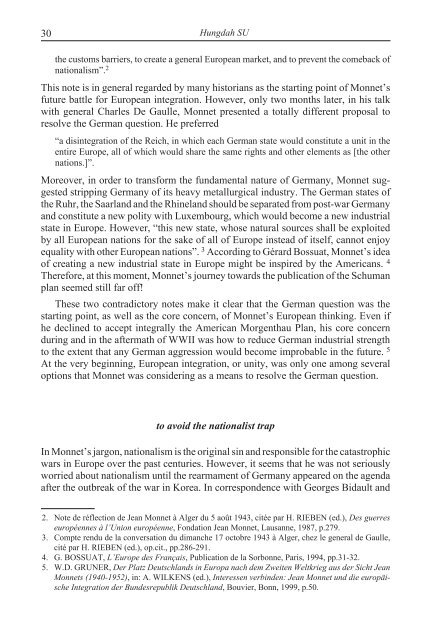Journal of European Integration History - Centre d'études et de ...
Journal of European Integration History - Centre d'études et de ...
Journal of European Integration History - Centre d'études et de ...
Create successful ePaper yourself
Turn your PDF publications into a flip-book with our unique Google optimized e-Paper software.
30<br />
Hungdah SU<br />
the customs barriers, to create a general <strong>European</strong> mark<strong>et</strong>, and to prevent the comeback <strong>of</strong><br />
nationalism”. 2<br />
This note is in general regar<strong>de</strong>d by many historians as the starting point <strong>of</strong> Monn<strong>et</strong>’s<br />
future battle for <strong>European</strong> integration. However, only two months later, in his talk<br />
with general Charles De Gaulle, Monn<strong>et</strong> presented a totally different proposal to<br />
resolve the German question. He preferred<br />
“a disintegration <strong>of</strong> the Reich, in which each German state would constitute a unit in the<br />
entire Europe, all <strong>of</strong> which would share the same rights and other elements as [the other<br />
nations.]”.<br />
Moreover, in or<strong>de</strong>r to transform the fundamental nature <strong>of</strong> Germany, Monn<strong>et</strong> suggested<br />
stripping Germany <strong>of</strong> its heavy m<strong>et</strong>allurgical industry. The German states <strong>of</strong><br />
the Ruhr, the Saarland and the Rhineland should be separated from post-war Germany<br />
and constitute a new polity with Luxembourg, which would become a new industrial<br />
state in Europe. However, “this new state, whose natural sources shall be exploited<br />
by all <strong>European</strong> nations for the sake <strong>of</strong> all <strong>of</strong> Europe instead <strong>of</strong> itself, cannot enjoy<br />
equality with other <strong>European</strong> nations”. 3 According to Gérard Bossuat, Monn<strong>et</strong>’s i<strong>de</strong>a<br />
<strong>of</strong> creating a new industrial state in Europe might be inspired by the Americans. 4<br />
Therefore, at this moment, Monn<strong>et</strong>’s journey towards the publication <strong>of</strong> the Schuman<br />
plan seemed still far <strong>of</strong>f!<br />
These two contradictory notes make it clear that the German question was the<br />
starting point, as well as the core concern, <strong>of</strong> Monn<strong>et</strong>’s <strong>European</strong> thinking. Even if<br />
he <strong>de</strong>clined to accept integrally the American Morgenthau Plan, his core concern<br />
during and in the aftermath <strong>of</strong> WWII was how to reduce German industrial strength<br />
to the extent that any German aggression would become improbable in the future. 5<br />
At the very beginning, <strong>European</strong> integration, or unity, was only one among several<br />
options that Monn<strong>et</strong> was consi<strong>de</strong>ring as a means to resolve the German question.<br />
to avoid the nationalist trap<br />
In Monn<strong>et</strong>’s jargon, nationalism is the original sin and responsible for the catastrophic<br />
wars in Europe over the past centuries. However, it seems that he was not seriously<br />
worried about nationalism until the rearmament <strong>of</strong> Germany appeared on the agenda<br />
after the outbreak <strong>of</strong> the war in Korea. In correspon<strong>de</strong>nce with Georges Bidault and<br />
2. Note <strong>de</strong> réflection <strong>de</strong> Jean Monn<strong>et</strong> à Alger du 5 août 1943, citée par H. RIEBEN (ed.), Des guerres<br />
européennes à l’Union européenne, Fondation Jean Monn<strong>et</strong>, Lausanne, 1987, p.279.<br />
3. Compte rendu <strong>de</strong> la conversation du dimanche 17 octobre 1943 à Alger, chez le general <strong>de</strong> Gaulle,<br />
cité par H. RIEBEN (ed.), op.cit., pp.286-291.<br />
4. G. BOSSUAT, L’Europe <strong>de</strong>s Français, Publication <strong>de</strong> la Sorbonne, Paris, 1994, pp.31-32.<br />
5. W.D. GRUNER, Der Platz Deutschlands in Europa nach <strong>de</strong>m Zweiten Weltkrieg aus <strong>de</strong>r Sicht Jean<br />
Monn<strong>et</strong>s (1940-1952), in: A. WILKENS (ed.), Interessen verbin<strong>de</strong>n: Jean Monn<strong>et</strong> und die europäische<br />
<strong>Integration</strong> <strong>de</strong>r Bun<strong>de</strong>srepublik Deutschland, Bouvier, Bonn, 1999, p.50.

















